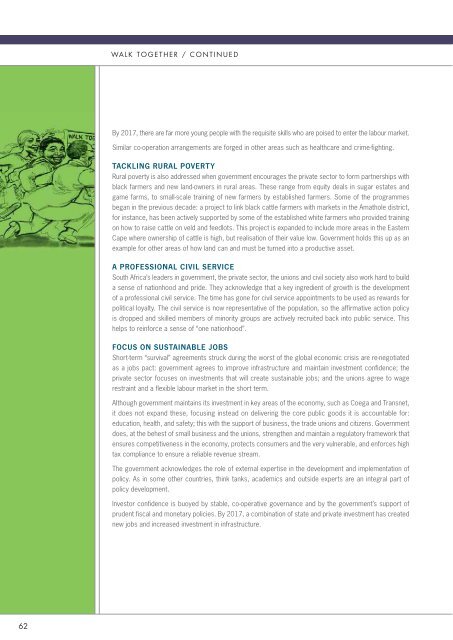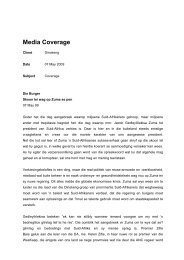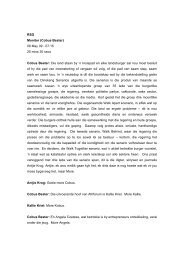Dinokeng Scenarios
Dinokeng Scenarios
Dinokeng Scenarios
You also want an ePaper? Increase the reach of your titles
YUMPU automatically turns print PDFs into web optimized ePapers that Google loves.
WALK TOGETHER / CONTINUED<br />
By 2017, there are far more young people with the requisite skills who are poised to enter the labour market.<br />
Similar co-operation arrangements are forged in other areas such as healthcare and crime-fighting.<br />
TACKLING RURAL POVERTY<br />
Rural poverty is also addressed when government encourages the private sector to form partnerships with<br />
black farmers and new land-owners in rural areas. These range from equity deals in sugar estates and<br />
game farms, to small-scale training of new farmers by established farmers. Some of the programmes<br />
began in the previous decade: a project to link black cattle farmers with markets in the Amathole district,<br />
for instance, has been actively supported by some of the established white farmers who provided training<br />
on how to raise cattle on veld and feedlots. This project is expanded to include more areas in the Eastern<br />
Cape where ownership of cattle is high, but realisation of their value low. Government holds this up as an<br />
example for other areas of how land can and must be turned into a productive asset.<br />
A PROFESSIONAL CIVIL SERVICE<br />
South Africa’s leaders in government, the private sector, the unions and civil society also work hard to build<br />
a sense of nationhood and pride. They acknowledge that a key ingredient of growth is the development<br />
of a professional civil service. The time has gone for civil service appointments to be used as rewards for<br />
political loyalty. The civil service is now representative of the population, so the affirmative action policy<br />
is dropped and skilled members of minority groups are actively recruited back into public service. This<br />
helps to reinforce a sense of “one nationhood”.<br />
FOCUS ON SUSTAINABLE JOBS<br />
Short-term “survival” agreements struck during the worst of the global economic crisis are re-negotiated<br />
as a jobs pact: government agrees to improve infrastructure and maintain investment confidence; the<br />
private sector focuses on investments that will create sustainable jobs; and the unions agree to wage<br />
restraint and a flexible labour market in the short term.<br />
Although government maintains its investment in key areas of the economy, such as Coega and Transnet,<br />
it does not expand these, focusing instead on delivering the core public goods it is accountable for:<br />
education, health, and safety; this with the support of business, the trade unions and citizens. Government<br />
does, at the behest of small business and the unions, strengthen and maintain a regulatory framework that<br />
ensures competitiveness in the economy, protects consumers and the very vulnerable, and enforces high<br />
tax compliance to ensure a reliable revenue stream.<br />
The government acknowledges the role of external expertise in the development and implementation of<br />
policy. As in some other countries, think tanks, academics and outside experts are an integral part of<br />
policy development.<br />
Investor confidence is buoyed by stable, co-operative governance and by the government’s support of<br />
prudent fiscal and monetary policies. By 2017, a combination of state and private investment has created<br />
new jobs and increased investment in infrastructure.<br />
62







